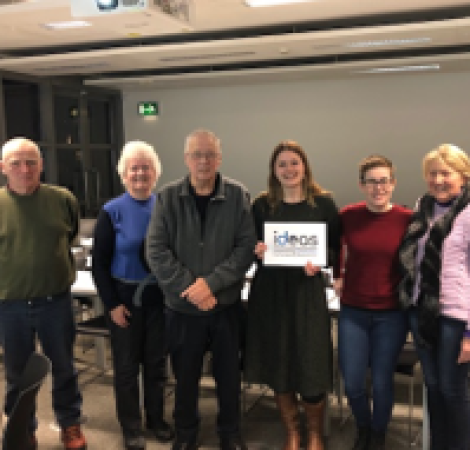Case Study
Home > Case Studies > The IDEAS study

PPI Ignite network
The IDEAS study
The IDEAS (Improving Diabetes Eye-screening Attendance) study aimed to develop and test an intervention to improve uptake of the national diabetic retinopathy screening programme, Diabetic RetinaScreen. The IDEAS study ran over a 12-month period [July 2019-July 2020]. This study was led by Dr Sheena McHugh, School of Public Health, UCC.
Five people with diabetes; three women and two men were part of the PPI panel.
Background
The intervention was developed by:
- Interviewing people with diabetes and health professionals to identify factors that impact whether a person eligible for screening attends for screening
- Using theories about behaviour change to decide what intervention content (or types of approaches) would be suitable to target those factors
- Conducting a consensus process with users of the intervention (people with diabetes and health care professionals) to find out their views on the proposed intervention: would the intervention work? would the intervention be acceptable to all involved? would the intervention work locally in all cases
The intervention was evaluated through a pilot trial, where four general practices were asked to keep doing what they always do while the other four practices introduced the intervention. The team then followed up with staff and patients who had delivered or received the intervention in order to understand their perspectives. They also recorded how much the intervention cost to deliver.
How we worked
A Patient and Public Involvement group were involved throughout the project both during intervention development and the pilot trial. They advised on:
- The development of the materials used as part of the intervention (the reminder letter, the script for reminder phone call and the information leaflet)
- The format and language of materials used to recruit patients into the study (patient recruitment materials, information leaflets and consent forms)
- How we shared the results of the study
The difference the input of the PPI group made was particularly clear in terms of an information leaflet we developed as part of the intervention. We decided the content of the leaflet with the input of health care professionals and people with diabetes. We knew broadly which key messages we wanted to include and how the intervention was to be delivered.
However, a lot of work went into designing the leaflet, namely, the wording, format, and layout. The PPI group were a crucial part of that design process. They had valuable suggestions which ranged from advice on the language (e.g., avoiding the use of the word ‘retinopathy’) to coming up with new ideas about how to communicate certain messages (e.g., suggesting we emphasise the friendliness of the screening programme and how accommodating they were should people need to change their appointment – something they had personally experienced).
We used the same processes to find people to take part in the consensus process and the PPI panel which we felt made it easier to find people. There was generally interest in both aspects of the project. There was some trial and error in the avenues we used. For example, we tried posting information in waiting rooms in general practices and a hospital diabetes clinic but did not see any uptake via those avenues. We had more success through attending structured education and support groups where we could explain the study in person, and also via social media through a gatekeeper (someone active on social media and online diabetes groups). A graphic designer developed our advertisement flyer, which we felt made it more engaging. We also included our photos on the flyer– while we do not know whether this made a difference hopefully it meant the team seemed more approachable!
We found it challenging to know how to weight the feedback from the PPI panel with that from other stakeholders (e.g., health care professionals, project advisory group): it was sometimes difficult to marry the different suggestions, often those around wording. This was particularly the case with the information leaflet we developed as part of the intervention. We finalised the content through discussing all feedback within the research team but we were not sure that this was the best solution.
Listen to the IDEAS PPI panel on a podcast.
This study was led by Dr Sheena McHugh, School of Public Health, UCC with co-investigators from:
School of Public Health (UCC)
Department of Economics (UCC)
Royal College of Surgeons, RCSI)
Collaborators:
HRB Primary Care Clinical Trials Network Ireland;
Department of General Practice in UCC
HRB Clinical Research Facility Cork
Other organisations involved:
Diabetes Ireland;
National Clinical Programme for Diabetes
Diabetic RetinaScreen;
Diabetes in General Practice (DIGP) Initiative;
Contacts
Name: Fiona Riordan
Email: fiona.riordan@ucc.ie
Research Funder(s)

Quote
Our facilitator's warm manner ensured that everyone felt that their opinions and thoughts were heard.
The meetings always made me feel comfortable.